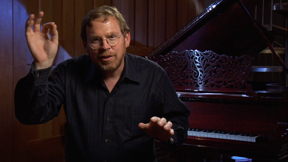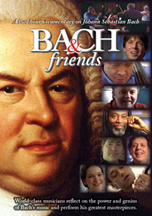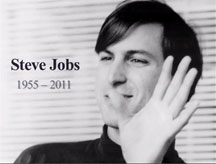Bach Project - Mike Hawley
Mike Hawley

One of the most amazing things about Bach’s music
is how it’s reverberated everywhere
and over time and through different cultures.
It’s almost impossible to imagine a world
in which Bach had not been born
because so many other people have been affected
in such profound ways by his music.



Chopin, whenever his kids came in for a lesson,
Chopin always had the Well-Tempered Clavier on the piano
because it was the first thing he played every day.
Mozart took several Bach pieces from the Well-Tempered Clavier
and arranged them for string quartet. Brahms and Busoni arranged the Chaconne.
I don’t think you can find a composer who isn’t deeply moved
and hasn’t been deeply affected the Bach’s music.
It just can't happen. And that’s astonishing. It’s hard to fathom
an artist in any other field having had such an impact.
But you see it everywhere. I mean, Bach’s music
has reverberated off of every other musician that’s worth his or her salt.
It’s so easy to get overwhelmed by the music
that people forget that behind it
was an actual flesh-and-blood guy.
I think like a lot of geniuses,
Bach had a life that was full of tragedy and full of joy.
He had an incredibly vigorous and challenging life.



If you look at some of the little data points:
when he was just a little kid, when he was nine years old,
his mom died. And when you’re nine years old,
you’re just about old enough to know what that means.
But when he was ten, his father died,
and so suddenly Bach was an orphan
and he grew up in the care of his older brother
without a mom or a dad.



And if you follow the threads of his career,
when he was eighteen or nineteen he was a star organist
and starting to get moving as a musician.
And around that time he got to know Maria Barbara
and the two of them fell in love and they got married
when they were twenty-two and started having babies right away
and babies need shoes and Bach needed a job
and so he got a great job in Arnstadt as an organist.
When he and Maria were twenty-eight, they had twins in February
and those two kids died within about three weeks of each other.
And, yes, it was three hundred years ago,
and, yes, infant mortality was more of prevalence then
but it doesn’t matter who you are. If you’re twenty-eight
and you and your wife have just had twins and they die, it kills you.
And there must be connections between these sorts of events
in Bach’s life and the music that was coming out.



If you fast forward ahead another ten years when Bach was thirty-five,
he had to go on a business trip to test out an organ, I think.
And while he was gone his beloved wife and mother of his seven kids died.
By the time he got home she’d already been buried,
and suddenly Bach was a widower with kids going down to about two years old
and no wife to look after them. The love of his life was gone,
and he had to pick himself up and still the music came gushing out.
The careers changed again, he found a new woman eventually.
But these were the kinds of big events that were going on in his life
and they’re absolutely related to the music.



I think that when you listen to the music of Bach
you’re overwhelmed by the emotional undercurrents
that are packaged in this sort of baroque formal structure.
And those emotions come from places that are very real
and very human and it’s a shame that we don't know more
about what Bach’s life was really like but I’m certain that
those great human moments were at the essence of the music that he wrote.



Bach’s music is filled with patterns.
There are many ways to look at those patterns
and see them and I think that’s a big part of
what gives Bach’s music its indestructible nature.
When you look at all the difference pieces that he wrote,
he’s a very pragmatic guy. He would take a violin partita
and turn it into a couple of licks in an organ cantata.
He would take a lute piece and arrange it for keyboard.
So he was always shifting his scores from one instrument to another.
You got music that was like DNA.
It could hop from one animal to the next without too much trouble.


Bach was one of the most versatile musicians that came along.
He could play all the instruments that he wrote music for quite capably.
He loved to sit in on the Brandenburg Concertos.
His favorite thing was to play the viola line
because he was sort of in the middle,
weaving his contrapuntal melodies above and below the others.
But he played all the keyboards. He played the flute.
He knew intimately the instruments that he was writing for.
So he was as versatile a musician as I think you could imagine.


When Bach got the gig as composer at Köthen,
he turned into a major hit factory.
The music that came gushing out is unbelievable.
You have all of the partitas for solo keyboard, the English suites,
the French suites, the Brandenburg Concertos,
all those things that kind of come in sixes,
the violin pieces, the cello pieces.
It’s an unbelievable outpouring of incredibly imaginative music
and catchy tunes. But you look at how much came out of this guy’s pen
in such a burst of a couple of years. It’s unbelievable
and yet it’s only one chunk of his output.
He was so industrious throughout his whole career.


To me one of the great miracles of music
is when you write a piece of music
and play a piece of music and things really work,
you can share a moment with the people that you’re playing for
and it’s a moment that’s so vivid that you will remember it
with perfect clarity for the rest of your life.
And the thing that’s even more amazing is that that music
can be picked up years later or centuries later
and have the same effect on groups of people.
It’s a way of connecting something that is very important
at a kind of mythic and spiritual level in people across many centuries.
It’s perfectly understandable to feel that you’re sticking your toe
in some water that has run very deep for very many years across many,
many, many generations of people and it’s one of those things
that’s hard to express and maybe it’s best expressed
by reveling in those great musical moments.


The music that Bach wrote at the very end of his days,
it’s impossible not to be affected by it.
But it is astonishing because by that point in his life,
Bach had done everything in music
and he’d seen everything that a worldly person
could experience in those times.
His last will and his testament were his last works.
As inevitably he began to confront his own mortality
and was suffering with infirmities and dealing with blindness,
he began to be forced to dictate his pieces.
And he put a lifetime of wisdom into them
and as much attention as he could
and of course they’re colored with all of the feelings
that he had as he was coming to the end of his time.
Great music has a way of keeping you on your toes mentally
and emotionally and the Art of the Fugue and Vor deinen Thron,
pieces like that are among the most astonishing things ever produced
by one of the most astonishing musicians who ever lived.

Mark Manring stills of Zenph Filming





